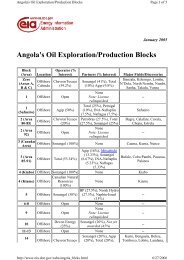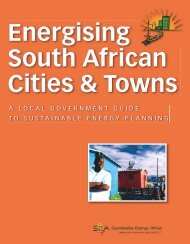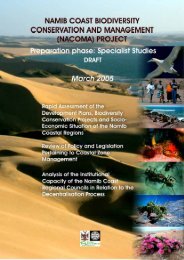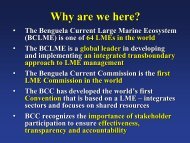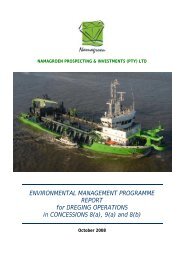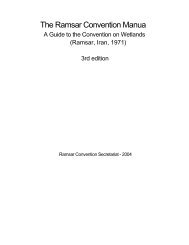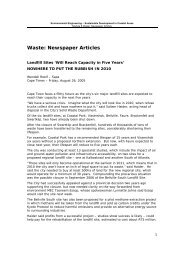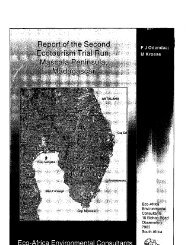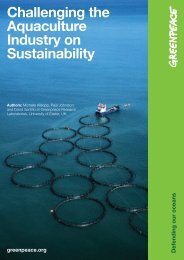Feasibility Study of Proposed Tourism Dev in Shewula, NE ...
Feasibility Study of Proposed Tourism Dev in Shewula, NE ...
Feasibility Study of Proposed Tourism Dev in Shewula, NE ...
Create successful ePaper yourself
Turn your PDF publications into a flip-book with our unique Google optimized e-Paper software.
<strong>in</strong>evitably lost. In some <strong>in</strong>stances, the researchers' <strong>in</strong>ability to communicate <strong>in</strong><br />
seSwati was accompanied by accusations or suspicions that they were not<br />
trustworthy. This affected the extent to which the community members were will<strong>in</strong>g to<br />
<strong>in</strong>teract 'truthfully' or <strong>in</strong> a forthright manner with the researchers.<br />
c) Lack <strong>of</strong> attendance at meet<strong>in</strong>gs<br />
Lack <strong>of</strong> attendance at meet<strong>in</strong>gs constituted a limitation on the effectiveness <strong>of</strong><br />
research procedures. Various community members identified several reasons why<br />
people did not attend meet<strong>in</strong>gs, <strong>in</strong>clud<strong>in</strong>g:<br />
• Ra<strong>in</strong>, which discourages residents from walk<strong>in</strong>g to meet<strong>in</strong>g places, especially<br />
after heavy falls when the road and side paths are very muddy;<br />
• Communication problems, some members simply were not <strong>in</strong>formed that<br />
meet<strong>in</strong>gs were to take place;<br />
• Boycotts, some felt that those who were aga<strong>in</strong>st the <strong>in</strong>itiative organised boycotts<br />
<strong>of</strong> meet<strong>in</strong>gs that were held to discuss issues relevant to the research;<br />
• Time constra<strong>in</strong>ts, many people <strong>in</strong> <strong>Shewula</strong> farm their lands <strong>in</strong> the morn<strong>in</strong>gs,<br />
mak<strong>in</strong>g attendance at early morn<strong>in</strong>g meet<strong>in</strong>gs difficult. Also, the research period<br />
overlapped with the Marula season, which <strong>of</strong>ten meant that the residents were<br />
unavailable. This was either because they were away, collect<strong>in</strong>g marulas and<br />
brew<strong>in</strong>g Marula beer, or because they had been savour<strong>in</strong>g the products <strong>of</strong> these<br />
labours, and were <strong>in</strong> no frame <strong>of</strong> m<strong>in</strong>d to discuss seriously the issues at hand.<br />
Therefore, most <strong>of</strong> the study team's meet<strong>in</strong>g were scheduled <strong>in</strong> the afternoons or<br />
over weekends. The latter meet<strong>in</strong>gs provided the opportunity for residents who<br />
work further afield, but return to <strong>Shewula</strong> on weekends, to have <strong>in</strong>put <strong>in</strong>to the<br />
research.<br />
• Confusion, misunderstand<strong>in</strong>gs and a belief that meet<strong>in</strong>gs called at a venue other<br />
than the Chiefs kraal, or at a venue <strong>in</strong> an area where people did not live, did not<br />
concern them. (For example, the poor attendance <strong>of</strong> Bucucotfombi residents at<br />
the Nduma <strong>in</strong>formation-shar<strong>in</strong>g session).<br />
• Transport, was a problem for those members <strong>of</strong> the community who lived some<br />
distance from meet<strong>in</strong>g areas.<br />
A conclusion to be drawn from these experiences is that attendance at meet<strong>in</strong>gs<br />
called cannot be guaranteed. This rapidly became an assumption for the subsequent<br />
planned research activities, with greater emphasis be<strong>in</strong>g placed on alternative<br />
methods for <strong>in</strong>teraction with the community.<br />
1.6.1.3. Limitations identified dur<strong>in</strong>g fieldwork and through<br />
<strong>in</strong>teraction with other people<br />
Limitations were also identified through <strong>in</strong>teraction with community members and<br />
other l&AP's. These <strong>in</strong>clude factors relat<strong>in</strong>g to the socio-political context <strong>in</strong> <strong>Shewula</strong><br />
and misunderstand<strong>in</strong>gs and misconceptions on the part <strong>of</strong> <strong>Shewula</strong> community<br />
members.<br />
a) Factors <strong>in</strong> the community politics, power relations and social context that<br />
affected the research process The absence <strong>of</strong> authority figures at some<br />
meet<strong>in</strong>gs sometimes created problems for the research. Past conflicts, rivalries and<br />
disagreements, both with<strong>in</strong> the community, and between the <strong>Shewula</strong> community<br />
and other parties arose, and could have been better controlled by an authoritative<br />
figure. In addition, some community members used the research process as a forum<br />
for discussion about their personal op<strong>in</strong>ions on various issues. While these<br />
situations had the potential to h<strong>in</strong>der the research process, they also provided<br />
useful opportunities to explore the th<strong>in</strong>k<strong>in</strong>g and



